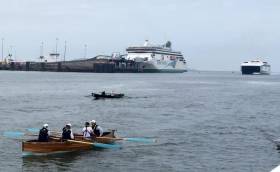Displaying items by tag: Sailings Cancelled
Sailings Cancelled on Brittany Ferries Rosslare-Cherbourg Service to Have Involved Final ‘Normandie’ Crossings
Today’s night-time Brittany Ferries sailing on the Rosslare-Cherbourg service is cancelled, this was to have been the third and final France-Ireland weekend roundtrip operated notably by Normandie in a relief role, writes Jehan Ashmore.
The operator’s website sailing update does not outline as to why this weekend’s crossings are cancelled, though the forecast is of a Status Yellow - Gale warning for all Irish coastal waters and the Irish Sea, with south to southwest winds to reach gale force 8 at times.
In addition as of Sunday, is the arrival of Storm Isha which has been issued with a Status Orange warning, and is set to bring very strong winds coupled with damaging gusts over the next few days.
The reason for the use of the English Channel serving cruiseferry Normandie that runs Portsmouth-Oustreham (Caen) was due to a major engine issue of the Ireland-France route’s ropax, Cotentin which is currently undergoing repair in Brittany.
It was on Saturday, 6 January, when Afloat during routine tracking noted with much surprise the Normandie in Rosslare Europort, as seen above, on the cruiseferry’s first ever time to an Irish port.
The unexpected inaugural call was forced, as Normandie had to be deployment so to stand in for the Cotentin. This led the ropax to head for the repairs in Brittany with an arrival to Damen Shiprepair Brest (DSB), where the facility features several quays (with the ropax alongside) and three dry docks, the largest being 420 x 80m, is one of the biggest in Europe.
Cotentin which has been the route’s main ship of the last two years, has been supported with other ferries of the E-Flexer class cruiseferries chartered from Stena.
Occasionally, the freight-orientated vessel built for Brittany Ferries in Finland, has operated just on the English Channel leaving the Irish route to a single-ship service, but also at times operating from France to both Ireland and England on a rotational basis. Either way this is in competition on the Ireland-France route as Stena Line also operates a service.
Next week’s sailing schedules, sees Brittany Ferries second introduced E-Flexer, Salamanca operating the service and the return of Cotentin, should this all go according to plan.
#FerryNews - Ulysses, Irish Ferries cruiseferry on the Dublin-Holyhead route has sailings cancelled today (2 May) and up to Friday (4 May).
According to the operator's website this is due to technical reasons. All of the cruiseferry's operated sailings in both directions on the Ireland-Wales route are cancelled.
Passengers instead can be accommodated on the route's fastferry, HSC Dublin Swift and the ropax ferry Epsilon.
For updated sailing information click the link here and also for contact details.
The 50,938 gross registered tonnes flagship Ulysses is the largest ro-ro ferry operating on the Irish Sea. Since introduction in 2001, the cruiseferry has held a strong reliable track record of service maintaining the core short-sea route.
The cruiseferry is no longer docked at Dublin Ferryport Terminal 1 having proceeded upriver to berth in Alexandra Basin.






























































